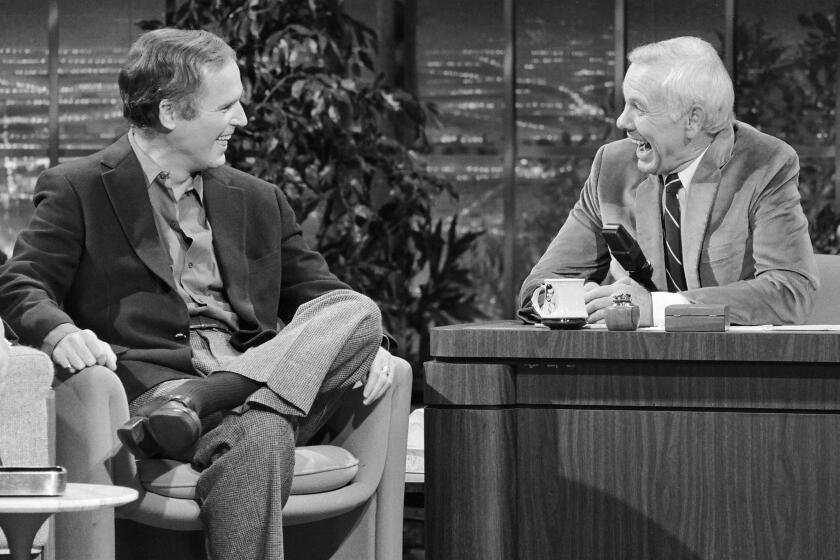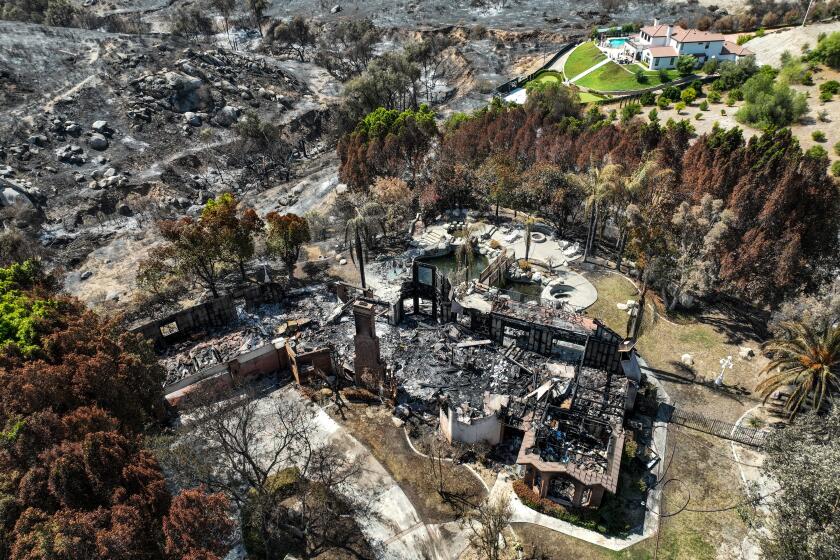Cal made you a deal, and selling cars was never the same
For Patti Williams, it was all about the jingle.
“‘Go see Cal, go see Cal, go see Cal,’” she sang, laughing. “He had a dealership in Anchorage where I lived, and I grew up seeing his commercials.”
Today, Williams is a professor of marketing at the University of Pennsylvania’s Wharton School, and you can hear the way she lights up discussing Cal Worthington, the legendary car salesman who died Sunday at age 92.
“He’d do whatever he could to make a deal,” Williams recalled. “You knew watching his ads that no matter how many hoops he had to jump through, he wanted your business.”
It’s an understatement to say they don’t make ‘em like that anymore.
Worthington belonged to the pantheon of TV pitchmen who understood instinctively that consumers don’t want to buy something from you. They want to like you.
These pitchmen knew that no gimmick was too cheesy or too over-the-top when it came to attracting attention.
For me, growing up in Los Angeles, it was all about Spot. I can clearly remember the commercial that won me over.
“Here’s Cal Worthington and his dog, Spot!” the announcer declared. And then we saw good-old Cal riding a hippo — a hippo! — past a long line of cars at one of his Southern California dealerships.
Worthington said he got the idea for Spot in the early 1970s after seeing rival car dealers popping up on TV with real dogs. He figured he could do them one better.
So Worthington’s dog was a lion, a tiger, an elephant, a chimpanzee, a rhino, a bear, a skunk, a killer whale or a hippopotamus. But never, of course, a dog.
And he really wanted to sell you a car. Like the song said: “If you’re looking for a better set of wheels, I will stand upon my head to beat all deals. I will stand upon my head till my ears are turning red.”
Dr. Seuss couldn’t have put it more succinctly.
At his peak, Worthington had 29 dealerships, including in Long Beach; South Gate; Claremont; Carlsbad, Calif.; Folsom, Calif.; Sacramento; Reno; Houston; Anchorage; and Phoenix.
Gail Tom, now a marketing professor at Cal State Sacramento, remembers watching Worthington’s antics on TV while she was growing up in Northern California.
“He was silly, but that’s what made him disarming,” she said. “He didn’t come across as sleazy or dishonest. People would laugh along with the joke.”
Worthington deserves to be included among the greats of TV pitchmen. I’d put him right up there with Ron Popeil of Veg-O-Matic fame (“It slices! It dices!) and Billy Mays (“That’s the power of OxiClean!”).
I’d even put Worthington alongside the great Ed Valenti, the genius behind Ginsu knives and the phrases “But wait! There’s more!” and “Now how much would you pay?”
“We call these ‘person brands,’” said Shashi Matta, a marketing professor at Ohio State University’s Fisher College of Business who reveled in Worthington’s commercials while a student at USC. “These are the pitchmen who become their own brands.”
Worthington realized that TV was a medium that rewarded spectacle, not subtlety. He was completely at ease with repetition, buying low-cost spots throughout the night as local stations filled the wee hours of the morning with old movies.
And then there was the tune. If ever there was an ear worm that could get stuck in your head, Worthington’s go-see-Cal jingle was it.
If you need a better car, go see Cal
For the best deal by far, go see Cal
If you want your payments low
If you want to save some dough
Go see Cal
Go see Cal
Go see Cal
It ain’t Shakespeare. But then again, Shakespeare wasn’t hell-bent on moving inventory off the lot.
TV ads aren’t exactly what you’d call sophisticated nowadays, but they’ve mastered the art of manipulation. Today’s commercials set a mood. They attempt in 30 seconds to get you to join a club of like-minded consumers.
Worthington was from a goofier and, I think, purer time when the salesmanship was more transparent and the pitch was more straightforward.
This was when we knew that it’s not nice to fool Mother Nature and that Mikey won’t eat Life cereal because he hates everything. Who wouldn’t want to buy the world a Coke?
Cal Worthington sold cars. That’s what he did for a living.
But he was also selling something else: A smile, maybe a chuckle. And the impression that he wouldn’t rest until you bought a new car.
Worthington said he’d eat a bug if he couldn’t get you into a new set of wheels.
You just knew he meant it.
David Lazarus’ column runs Tuesdays and Fridays. He also can be seen daily on KTLA-TV Channel 5 and follow on Twitter @Davidlaz. Send your tips or feedback to david.lazarus@latimes.com.
More to Read
Inside the business of entertainment
The Wide Shot brings you news, analysis and insights on everything from streaming wars to production — and what it all means for the future.
You may occasionally receive promotional content from the Los Angeles Times.











